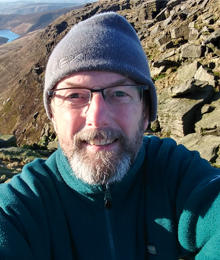Dr Mike Dempsey
Dr Mike Dempsey is Head of Centre for Postgraduate Researchers at Manchester Metropolitan University. In this blog, he tells us more about the various genres the Bad Bugs Book Club have read and discussed.

How do you encourage undergraduates studying microbiology to read fiction? Get them to read a book from the extensive list that the Bad Bugs Book Club has read! Started ten years ago by Professor Jo Verran, currently Emeritus Prof. at Manchester Metropolitan University, we have read upwards of 50 books where microbiology is a major theme. As a service to readers, Jo produces a reading guide and a meeting report which includes our comments and questions, as well as her own research into the book. These are available to view on the Bad Bugs Book Club website.
We have read novels from most genres, as well as a few non-fiction books. However, finding the perfect blend of good literature and accurate microbiology has been a challenge. So, any budding authors out there with a knowledge of microbiology, there is a niche in the market for you!
We have held meetings approximately every two months over the past ten years, normally in a suitable watering hole; i.e. one without too much noise but with a good vibe and quality beverages. But occasionally, we have held our discussions in more prestigious surroundings, e.g. the Manchester Museum, one of the last, original Victorian museums left in the UK and currently undergoing a facelift.
Some of our most successful meetings have been when Jo has been able to combine C. P. Snow’s Two Cultures! It has been great to learn hidden secrets in novels from experts in literature, as well as the occasional meeting where either the author has been in attendance or we have been able to have a Q&A with them via the internet. These have been a true two-way learning experience, with members from each “culture” learning from each other’s expertise.
My favourite novel, and that of several other regulars, was Philip Roth’s Nemesis (2010), which is set during the Newark polio epidemic of 1944. Despite the research by Karl Landsteiner and Erwin Popper, identifying a virus causing poliomyelitis in 1908, the novel highlights the ignorance of its cause amongst the general public in 1944, with Italian immigrants getting the blame in some quarters. Clearly, public education and engagement is as important today, e.g. to counteract the antivaxer movement. As a mark of its excellence, Nemesis was shortlisted for the 2011 Wellcome Trust Book Prize for excellent medicine in literature and we certainly concur with its selection!
Another favourite was Microbe Hunters (1926), by Paul de Kruif, which devotes a chapter to eleven of the most important scientists in the development of microbiology. Starting with the father of the discipline and the first person to actually see micro-organisms in the 17th century, Antonie van Leeuwenhoek; to Paul Ehrlich, who discovered a magic bullet for the treatment of syphilis in 1909. This is not a novel but more a series of well-written, easily readable biographies. It has been cited many times as the stimulus for a career in science or medicine, surely the mark of a great book?
Linked to our reading of Microbe Hunters, Jo screened the film Dr Ehrlich's Magic Bullet, who was directed by William Dieterle in the USA in 1940. Our post film discussion was greatly enhanced by the participation of biologist-turned film studies lecturer– David Kirby– who was Professor of Science Communication Studies at the University of Manchester’s Centre for the History of Science, Technology and Medicine. Similarly, to our meetings with literature specialists or authors, David’s knowledge of both biology and film made for several excellent meetings over the years, until he returned to the USA last year.


